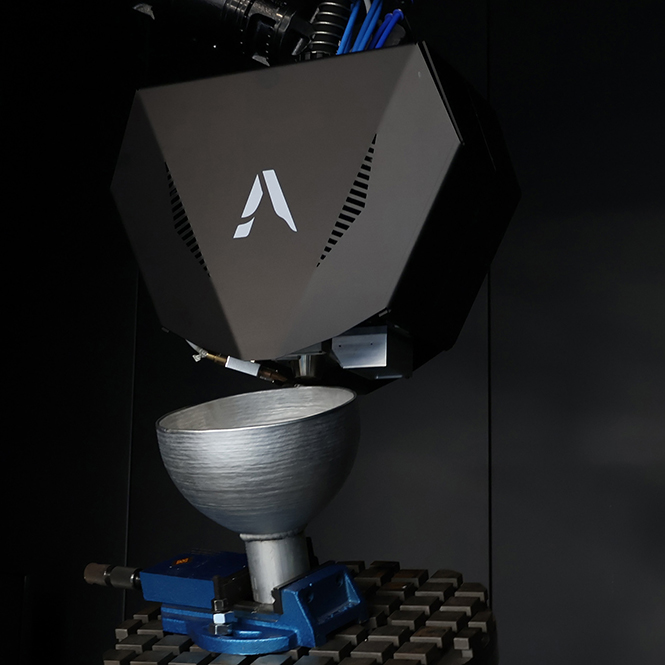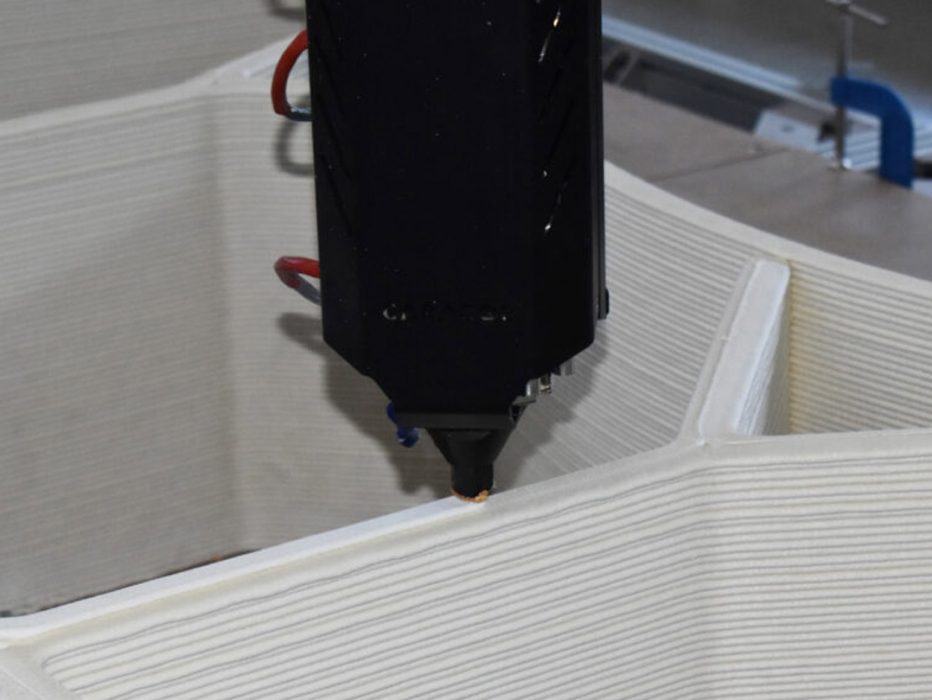Advanced polymers engineered for Caracol Large Format Additive Manufacturing systems
Caracol works with its in-house material labs and materials partners to develop, qualify and supply new additive manufacturing polymers for its FGF (Fused Granular Fabrication) process. This includes high-temperature materials suitable for extreme environment applications such as autoclave production cycles, tested to guarantee efficient production, top technical properties, and minimizing costs and waste. Every day, we work to identify new 3D printing thermoplastic materials to fit our clients’ specific application requirements and help create custom compounds when needed.
Materials Portfolio
-
PET-GPolyethylene terephthalate glycol
This polyester-based polymer can be found in recycled, transparent, or glass fiber reinforced versions. It is high impact, chemical and UV resistant and goes up to 80°C (176°F) working temperature. Its glass-fiber reinforced version is also fire resistant. Therefore, PET-G is ideal for PVC-like, outdoor and indoor finished parts and design applications as well as for prototypes, and railway exterior components.
RECYCLED
rPET-G (transparent)COMPOSITE & RECYCLED
rPET-G +20% Glass Fiber (light blue)COMPOSITE & RECYCLED
rPET-G +30% Glass Fiber (grey/white/black) -
ABSAcrylonitrile butadiene styrene
Recommended when glues, coating or other chemicals need to be applied, its has good mechanical properties, is stable during prints. This cost-effective material is qualified by Caracol for low temperature applications up to 80°C (176°F) like: prototyping, vacuum tight molds and tools for trimming and gripping, and finished functional parts not subjected to high mechanical pressure.
COMPOSITE
ABS + 20% Carbon Fiber (black)COMPOSITE
ABS + 20% Glass Fiber (natural white)COMPOSITE & RECYCLED
ABS + 20% recycled Carbon Fiber (black) -
PPPolypropylene
Highly resistant to solvents and chemicals, it is a lightweight polymer with good mechanical properties such as elasticity and impact resistance. It can go up to 80° C (176°F) as working temperature and can replace glass fiber and aluminum applications. It is qualified by Caracol to produce functional parts and tooling in several sectors as marine, aerospace, design, and architecture.
COMPOSITE & RECYCLED
rPP + 30% Glass Fiber (ivory) -
ASAAcrylonitrile styrene acrylate
Highly recommended when UV light protection are required, it has good mechanical properties such as elasticity and strength (particularly when reinforced with glass fiber). This material is qualified by Caracol and highly employed for outdoor applications, design and furniture finished parts.
NATURAL
ASA (White)COMPOSITE
ASA + 20% Glass Fiber (ivory) -
PLAPolylactic acid
A very easy-to-process biobased material that comes in a natural shade (transparent with milky hues) and can be easily customized in color. It is extensively used for in-door furniture and design-related elements and can be printed in its recycled and biobased versions too.
BIOBASED
PLA (transparent, natural - can be colored)BIOBASED & COMPOSITE
PLA + 50% Cork / 20% Oyster / 40% Olive / Pine / Coffee / Algae (natural colors) -
PCPolycarbonate
Highly suggested when chemical resistance is required, it has great mechanical and thermal properties, great resistance to heat. The carbon fiber-reinforced composite can withstand mid-temperature autoclave processes, going up to 130°C (266°F) and 3-6 bars in terms of working temperature and pressure. It is ideal for functional and engineering applications, including autoclave molds and heat-resistant cure tools as well as lamination tooling.
COMPOSITE
PC + 20% Carbon Fiber (black) -
PEIPolyetherimide
Excellent flame retardancy with UL94 V0, outstanding heat-resistance, stable physical and mechanical properties, high strength, and stiffness up to 200°C (392°F), and great chemical resistance to fluids such as hydrocarbons and alcohols. Ideal for high-temperature tools, as well as for structural end parts in sectors like aerospace, automotive and railways.
COMPOSITE
PEI + 20% Carbon Fiber (black) -
HDPEHigh Density Polyethylene
A polyethylene-based compunt, which is highly performing in chemically aggressive and corrosive environments.
COMPOSITE
HDPE + 20% Carbon Fiber (black) -
PA6Polyammide 6
A flame retardant polyammide (V0 class according to UL94), it has been certified for several sectors such as railways sector (EN45545).
COMPOSITE
PA6 + 25% Glass Fiber (grey) -
TPEHigh strength and flex elastomer
This TPE-based high-strength and flexibility elastomer is ideal for topologically optimized pliable structures, such as cushions and seating. It is tested up to 90 Shore A and 80°C (176°F) as working temperature, and it is extensively used to print large-scale rubber-like parts for furniture, seating, and design-related components.
NATURAL
TPE (natural white)

Additive Manufacturing Industries
Revolutionizing manufacturing processes with cutting-edge 3D printed applications
Many industries are adopting Caracol’s large format additive manufacturing technology due to its benefits in production efficiency and sustainability.
Success Stories
Check out some of our projects
Read how cutting-edge players across sectors are using large format 3D printing for industrial applications and how Caracol is helping them transform their manufacturing processes.

















